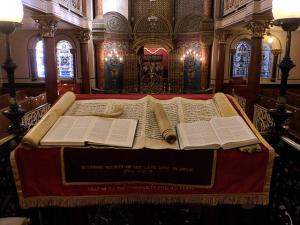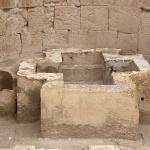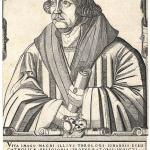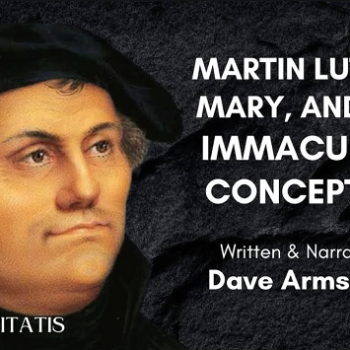“Please Hit ‘Subscribe’”! If you have received benefit from this or any of my other 4,600+ articles, please follow this blog by signing up (with your email address) on the sidebar to the right (you may have to scroll down a bit), above where there is an icon bar, “Sign Me Up!”: to receive notice when I post a new blog article. This is the equivalent of subscribing to a YouTube channel. Please also consider following me on Twitter / X and purchasing one or more of my 55 books. All of this helps me get more exposure, and (however little!) more income for my full-time apologetics work. Thanks so much and happy reading!
***
Johann Eck (1486-1543) was a German Catholic theologian, who was arguably one of Martin Luther’s two most important and formidable debate opponents, along with Erasmus (I’ve compiled several of his devastating replies to Luther as well). He was ordained as a priest in 1508 and in 1510 was installed as a professor of theology at the University of Ingolstadt in Bavaria: which lasted for thirty years. He mastered both Greek and Hebrew and had a prodigious memory, boundless energy, and very considerable debating skills. He famously engaged Luther for eighteen days in the Leipzig Disputation of July 1519.
Eck’s argumentation might be said to be one of the quintessential examples of the Catholic theological and polemical response to the Protestant Revolt up to the opening of the Council of Trent in 1545. This is one of many excerpts from his best-known and principal volume, Enchiridion of Commonplaces Against Luther and Other Enemies of the Church. It first appeared in 1529 and eventually went through 91 editions. I will be using a later edition from 1541 (translated by Ford Lewis Battles, Grand Rapids, Michigan: Baker Book House, 1979; now in the public domain).
Eck’s words will be in black; my interjections in blue, and citations from Luther and other famous Protestants in green. Line breaks imply breaks in the text. I use RSV for scriptural citations.
***
St. Paul gives thanks to God in his prayers, 0 Most Reverend Father and Prince, when he hears of the charity of Philemon and of the faith which he had in the Lord Jesus, and toward all his saints [Philemon v. 4-5]. [“I thank my God always when I remember you in my prayers, because I hear of your love and of the faith which you have toward the Lord Jesus and all the saints”], For Paul, supremely conscious of the secrets of God, had an insight that the faith of any man shines before God when he strives to conform it as much as possible to the saints and friends of God, just as Israel believed not only the Lord but also Moses his servant [Ex 14:31]. [“. . . and they believed in the LORD and in his servant Moses.”] And all good and sincere men have earnestly distinguished themselves from the time of Christ’s passion even to the present day, but not more than befits wise men [Rom 12:16]. [“Live in harmony with one another; do not be haughty, but associate with the lowly; never be conceited.”] But those who (neglecting this Apostolic rule) “have walked in wonderful things above themselves” [Ps 130:1] [“O LORD, my heart is not lifted up, my eyes are not raised too high; I do not occupy myself with things too great and too marvelous for me.”] and exalted themselves as Lucifer and the noonday demon [cf. Ps 91:6], unwilling to believe in the saints of God, are deceived, and have been given over to the precipice of errors, while they are not afraid to despoil those ancient apostolic men, remarkable in learning, eminent in moral character, notable in authority, and famous for miracles. . . . he who is not convinced by the harmony of the succession of holy fathers in the Church, by the profession and unanimous verdict of councils, must with insolent and proud rashness dash headlong into all sorts of abominable errors. Luther preferred to follow this insane and mad rashness, with his confederates, rather than piously believe, with Philemon, in the saints of God, and the rule of faith which the whole Church observes. For with perverse will he murmurs against the ministers of God, the most holy fathers, and the whole Church, putting his own judgment (0 utterly blind pride of the vainest of men!) ahead of all the foremost men of the Church.
So, for example, Luther wrote:
Therefore, I now let you know that from now on I shall no longer do you the honor of allowing you – or even an angel from heaven – to judge my teaching or to examine it. For there has been enough foolish humility now for the third time at Worms, and it has not helped. Instead, I shall let myself be heard and, as St. Peter teaches, give an explanation and defense of my teaching to all the world – I Pet. 3:15. I shall not have it judged by any man, not even by any angel. For since I am certain of it, I shall be your judge and even the angels’ judge through this teaching (as St. Paul says [I Cor. 6:3 ]) so that whoever does not accept my teaching may not be saved – for it is God’s and not mine. Therefore, my judgment is also not mine but God’s. (Against the Spiritual Estate of the Pope and the Bishops Falsely So-Called, July 1522; from Luther’s Works, vol. 39, 248-249)
But he didn’t disregard all of tradition, by any means. As usual, he was a “mixed bag”:
He [Karlstadt] would like with such smoke and mist to obscure altogether the sun and light of the gospel and the main articles of Christianity, so that the world might forget everything that we have hitherto taught. (Letter to the Christians at Strassburg in Opposition to the Fanatic Spirit, Dec. 1524, tr. Conrad Bergendoff; in LW, v. 40)
The amazing thing, meanwhile, is that of all the fathers, as many as you can name, not one has ever spoken about the sacrament [of the Eucharist] as these fanatics do. . . . Certainly among so many fathers and so many writings a negative argument should have turned up at least once, as happens in other articles; but actually they all stand uniformly and consistently on the affirmative side. (That These Words of Christ, “This Is My Body,” etc., Still Stand Firm Against the Fanatics, March 1527, tr. Robert H. Fischer; in LW, v. 37)
Since our baptizing has been thus from the beginning of Christianity and the custom has been to baptize children, . . . if we are going to change or do away with customs that are traditional, it is necessary to prove convincingly that these are contrary to the Word of God. (Concerning Rebaptism, Jan. 1528, tr. Conrad Bergendoff; in LW, v. 40)
[T]he Anabaptists proceed dangerously in everything. Not only are they not sure of themselves but also they act contrary to accepted tradition . . . (Ibid.)
[I]f the first, or child, baptism were not right, it would follow that for more than a thousand years there was no baptism or any Christendom, which is impossible. For in that case the article of the creed, I believe in one holy Christian church, would be false. . . . If this baptism is wrong then for that long period Christendom would have been without baptism, and if it were without baptism it would not be Christendom. . . . But the fact that child baptism has spread throughout all the Christian world to this day gives rise to no probability that it is wrong, but rather to a strong indication that it is right. (Ibid.)
Further, it is dangerous to accept such new teaching [a merely symbolic Eucharist] in contrast to lucid and open texts and the clear words of Christ, and to abandon this old belief (which from the beginning till now has been maintained in all of Christendom) on the basis of such poor [Scripture] passages and thoughts as [our opponents] have thus far brought forth . . . (Letters II, ed. and tr. Gottfried G. Krodel; to Landgrave Philip of Hesse, 20 May 1530; in LW, v. 49)
[Y]ou would be troubled not only for the sake of your soul, which would be damned thereby, but for the sake of the whole Christian Church, for if you allow any to teach against the long and unanimously held doctrine of the Church when you can prevent it, it may well be called an unbearable burden to conscience. . . . For we must not trifle with the articles of faith so long and unanimously held by Christendom, . . . (To Duke Albert of Prussia, Feb. or early March 1532)
See also my articles, and book:
Martin Luther’s Remarkably “Pro-Tradition” Strain of Thought [1-18-08]
The “Catholic-Sounding” Luther: 25 Examples [6-16-08]
Martin Luther: Catholicism is Christian [6-12-13]
Top Ten Remarkable “Catholic” Beliefs of Martin Luther [1-19-15]
The “Catholic” Luther : An Ecumenical Collection of His “Traditional” Utterances (Dec. 2014, 166 pages)
Luther had, however, rejected at least fifty Catholic doctrines or practices by 1520, before he was excommunicated (as I have documented form his own words). Like I said: “mixed bag.”
***
Christ did not write any book, nor did He bid the disciples or apostles to write one, yet He gave many precepts concerning the Church; hence when about to send apostles out to plant the Church, He did not say, “Go write,” but “Go into the whole world and preach the Gospel to every creature” [Mt. 24:14], Therefore the law was written on tablets of stone, but the Gospel on hearts. “Since you are a letter of Christ, sent out by us, and written not with ink but with the Spirit of the living God, not in tablets of stone, but in the physical tablets of the heart” [2 Cor 3:3].
Thus the apostles without the Scripture of the New Testament chose Matthias [Acts 1:22ff], ordained seven deacons [Acts 6:3]; Peter caused Ananias and Sapphira to die [Acts 5:1ff]. Even though the apostles were very diligent in sowing the Word of God, yet very few things are found written by them. It follows logically that they taught many more things than they wrote; the things taught have equal authority with the things written.
Let the objection immediately be raised against him: how does he know that these Scriptures are canonical except from the Church, for why does he believe the Gospel of Mark, who did not see Christ, to be canonical, and not the Gospel of Nicodemus, who saw and heard Christ, as John testifies [Jn 3:1ff]? So why has the Gospel of Luke the disciple been received, and the Gospel of Bartholomew the apostle been rejected, unless we humbly confess the authority of the Church with the Blessed Augustine, something Luther sometimes taught, that the Church could judge concerning the Scriptures.
Hence, Augustine, Against the Epistle Called Fundamental, 5.6 [PL 42.176]: “I would not have believed the Gospel unless the authority of the Church had moved me to do so.”
Luther largely agreed, at least in this statement:
St. Paul says in Rom. 1, 2, that the Gospel was promised afore in the Holy Scriptures, but it was not preached orally and publicly until Christ came and sent out his apostles. Therefore the church is a mouth-house, not a pen-house, for since Christ’s advent that Gospel is preached orally which before was hidden in written books. It is the way of the Gospel and of the New Testament that it is to be preached and discussed orally with a living voice. Christ himself wrote nothing, nor did he give command to write, but to preach orally. Thus the apostles were not sent out until Christ came to his mouth-house, that is, until the time had come to preach orally and to bring the Gospel from dead writing and pen-work to the living voice and mouth. (Sermon for the First Sunday in Advent; Matthew 21:1-9, 1521)
i. Scripture teaches: “Remember to hallow the Sabbath day; six days shall you labor and do all your work, but the seventh day is the Sabbath day of the Lord your God,” etc. [Ex 20:8ff] Yet the Church has changed the Sabbath into Sunday on its own authority, on which you have no Scripture.
ii. Christ said to His disciples on the mountain: “I have not come to abolish the law but to fulfill it” [Matt 5:17]. And yet the Church of the apostles in council [Acts 15] boldly made pronouncement on the cessation of legal matters. . . .
iv. Scripture is defined in the council: “It seemed good to the Holy Spirit and to us” [Acts 15:28] etc., “that you should abstain from sacrifices offered to idols, and blood and things strangled [v. 29]. This matter, so clearly defined and expressed, the Church by her authority changed, because she uses both blood and strangled meat. . . .
“And when Paul and Barnabas had no small dissension against them, the brethren decided that Paul and Barnabas and certain others of them should go up to the apostles and presbyters in Jerusalem about this question” [Acts 15:2] . . . And what was the Church? Not the whole congregation, but they went up to the apostles and presbyters who represented the Church.
See the Related Materials:
Part IV: Erasmus’ Hyperaspistes (1526): Luther’s Anti-Traditional Elements
Part VI: Erasmus’ Hyperaspistes (1526): Sola Scriptura and Perspicuity of Scripture
***
*
Practical Matters: Perhaps some of my 4,600+ free online articles (the most comprehensive “one-stop” Catholic apologetics site) or fifty-five books have helped you (by God’s grace) to decide to become Catholic or to return to the Church, or better understand some doctrines and why we believe them.
Or you may believe my work is worthy to support for the purpose of apologetics and evangelism in general. If so, please seriously consider a much-needed financial contribution. I’m always in need of more funds: especially monthly support. “The laborer is worthy of his wages” (1 Tim 5:18, NKJV). 1 December 2021 was my 20th anniversary as a full-time Catholic apologist, and February 2022 marked the 25th anniversary of my blog.
PayPal donations are the easiest: just send to my email address: [email protected]. Here’s also a second page to get to PayPal. You’ll see the term “Catholic Used Book Service”, which is my old side-business. To learn about the different methods of contributing (including Zelle), see my page: About Catholic Apologist Dave Armstrong / Donation Information. Thanks a million from the bottom of my heart!
*
***
*
Photo credit: A lovely visual of biblical “tradition”: Torah scrolls at Middle Street Synagogue, Brighton, England. Photograph by “The Voice of Hassocks” (5-5-13) [Wikimedia Commons / Creative Commons CC0 1.0 Universal Public Domain Dedication]
Summary: One of a series of posts documenting the Catholic apologetics efforts of Johann Eck (1486-1543) against various Protestants. This installment addresses tradition.














